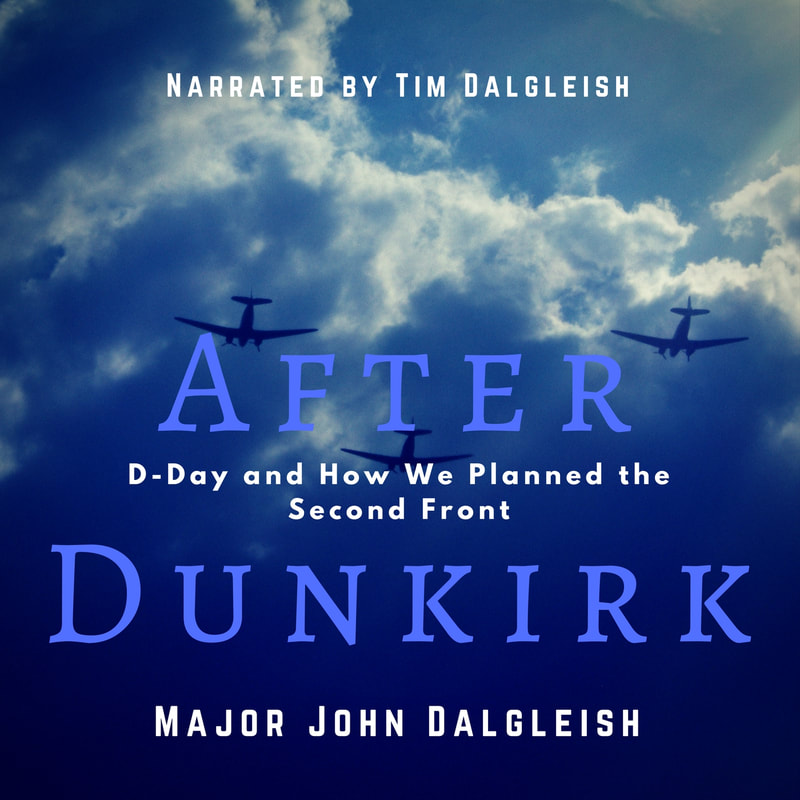I’m never exactly certain why we find stories of our family and ancestors quite so interesting (especially when the detail is often quite ordinary) but I expect it’s largely to do with our own mortality. The familial chain of being, the elements of what make us, us, and how quickly we will become a ‘dead link’ in the chain, has an inescapable, morbid resonance. John’s personal and professional working life and experience in documenting the war were entwined and both were relevant to the book and the story of planning D-Day. For me, however, it is the small personal details that resonate most, like John standing making the trip to the cliffs of Dover on the eve of D-Day and contemplating the finale to all his planning. Awesome, brutal, and fearful. A morbid event indeed. Planning for such an event, never being the equal, to the event itself. A period and a day one would not forget.
(Three dots, are the ellipsis, that indicates where the extract has been cut.)
‘Major John Dalgleish was my Great Uncle. His life and times were always a mysterious and intriguing part of my family history…
His first wife was Wendy Barrie, god daughter of J.M. Barrie. Her name and reputation are well and truly forgotten now but, at one time, she was a well know Hollywood film star. Her name may not ‘ring any bells’ with you but if you’ve seen films with the likes of Humphrey Bogart, James Stewart, Charles Laughton, Bing Crosby, Spencer Tracy, Edward G. Robinson, Jack Lemmon, Basil Rathbone, George Sanders and others, then you may well have seen her, as their leading lady. She also, reputedly, got to know some of those gentlemen rather well…
She went on to become one of the first film stars to do commercials on television (Revlon) and had her own radio show in New York. She succeeded in getting her name on the Hollywood Walk of Fame but is a ‘star’ that has failed to shine very brightly since.
So, at what point, in this busy career, did my Great Uncle John, not only get to know her, but marry her? In some ways, it doesn’t really matter, what does matter, is that Uncle John, was the kind of guy such stories attached themselves to…
Given that Wendy Barrie, once had a fling with the likes of ‘Bugsy’ Siegel, I guess marriage, to such a ‘character’ as my Uncle John, is perhaps not so implausible. How he ever became a Major, in the British army, is anybody’s guess but, I guess, he was a smooth talker, if nothing else. After the war, he styled himself as a businessman or what people today would call an entrepreneur (but think: a cross between Oscar Schindler and Richard Branson, rather than Bill Gates)…
My dad always insisted that it was Uncle John who first introduced the sapphire gramophone needle into Britain. Whatever the truth of that claim, public demand for the sapphire gramophone needle, I would surmise, never reached fever pitch…
Dad also told me unlikely sounding stories of how Uncle John had been involved in diamond mines in South Africa, making and losing several fortunes. These stories, which usually involved financial shenanigans and the, slightly dodgy, selling of shares, were entertaining. However, I’ve increasingly come to doubt there precise veracity. I have a feeling that, as with most good ‘true’ stories, it is how the teller tells the tale that really counts…
In telling those stories, about Great Uncle John, my old Dad was, in a very, very, minor way, being more like Billy Liar than Joe Lampton, and exaggerating, in this case, the deeds of a relation. He was enjoying, retelling and retailoring, the supposed ‘misdeeds’ of John (who was probably a pretty good raconteur himself)…
Having read Great Uncle John’s narrative, of how the preparations for D-Day were conceived and carried out, I do not find much evidence of exaggeration or embellishment. Perhaps, in reality, this was the one time in his life when he felt fidelity to the truth was as important as recounting the story in the first place. The text is, in the main, a pretty sober account of the matters which occupied the planners. He is talking of war, to his ‘countrymen’, as he would have put it.
…whilst I do not agree with much of the sentiment and have never though highly of ‘esprit de corps’ and so on, what I do note, is Uncle John’s genuineness, under his own standards, to tell the truth, of his part and other people’s parts, in the historic events or World War II.
This is not a raconteur spinning yarn, egging the yoke or spilling the beans. As the original title of the book shows, We Planned the Second Front – The Inside History of How the Second Front was Planned, with what is almost a tautology between title and subtitle, he wasn’t attempting to present anything other than a clear and straightforward account of events….
He wanted the facts to be recorded - so that his generation (as much, if not more, than any future generation) could understand, some of what had happened to them and their country - largely without too much emotion. As a historical document I think the book deserves to be republished and in that respect I am happy that I have been able to do that for him.

 RSS Feed
RSS Feed
